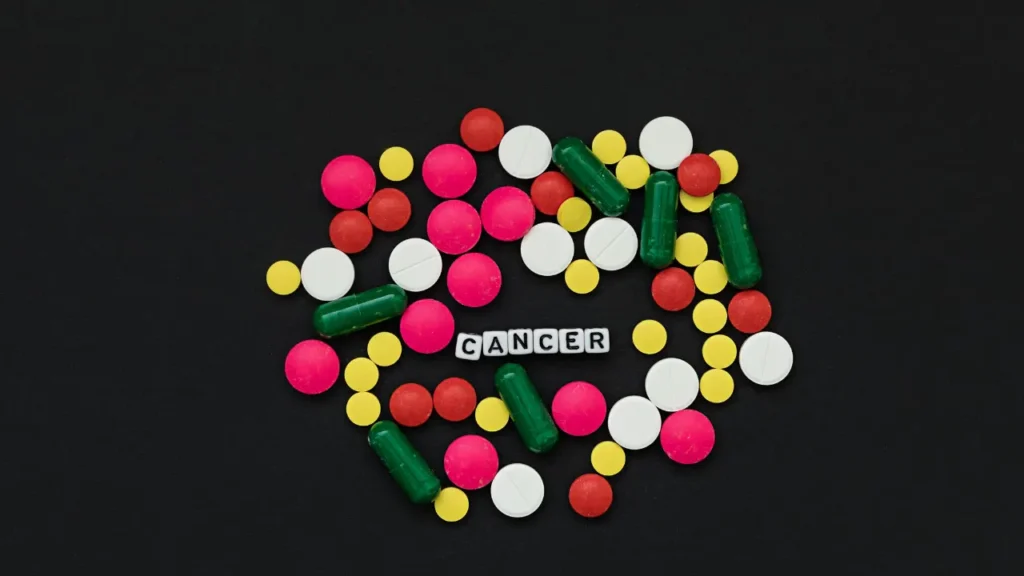Description
The development of aberrant moles or skin lesions due to the unchecked expansion of melanocytes is a hallmark of melanoma. These lesions may initially manifest as multicolored, asymmetrical formations with uneven borders. Early melanoma identification is essential because it improves prognosis and increases the possibility of successful therapy.
You May Also Like:
NATUREMYST KRILL OIL: A REVIEW OF THE FACTS ABOUT THIS LEADING OMEGA-3 PRODUCT
Melanoma: Description, Causes, And Treatment Protocol is an original (HealthXWire) article.
Possible Causes
A combination of hereditary and environmental factors might contribute to the development of melanoma, the deadliest type of skin cancer. The main culprit is ultraviolet (UV) radiation exposure, which can come from sunlight or artificial sources such as tanning beds. Previous experiences of sunburns and intense, sporadic, and prolonged exposure to sunlight all raise the risk.
Additional risk factors comprise light hair, fair skin, and eyes, an abundance of moles, the existence of abnormal moles or dysplastic nevi (an extended family record of melanoma), specific genetic abnormalities such as BRCA2, CDKN2A, a weaker immune system, a prior diagnosis of melanoma, and age (risk rises with age). High altitude, closeness close to the equator, together with geographic location is also important.
Melanoma is caused by behavioral factors like smoking, drinking alcohol, eating a unhealthy diet that is deficient in vegetables and fruits, along with not using proper sun protection techniques. Carcinogen exposure at work, ongoing inflammation, and some drugs such as immunosuppressants can all raise the risk.
In order to limit these risk factors and reduce the likelihood of acquiring melanoma, it is crucial to exercise sun protection measures, undertake routine self-examinations, and obtain professional dermatological support.

Exacerbating and Mitigating Factors
Melanoma risk may be increased by multiple variables. The possibility of cancer is increased by prolonged and intense sun exposure, particularly when children have blistering sunburns. On the contrary, mitigating variables include routine use of sun protection measures including broad-spectrum sunscreen, protective attire, and securing shade during extreme UV hours.
Standard Treatment Protocols
Depending on the disease’s phase and severity, several melanoma therapy regimens are used. Surgery, in which the tumor alongside the boundary of healthy tissues around it is eliminated, poses as the main form of therapy for localized melanomas. Regarding early-stage melanomas, this surgery is frequently curative.
Nevertheless, additional therapies could be needed when melanoma has progressed outside the skin. Here are a few therapies that target melanoma progression.
Targeted Therapy
Drugs utilized for targeted therapy are created to selectively target genetic defects or mutations seen in cancer cells. For tumors with particular mutations in genes like BRAF or NRAS, targeted therapy is frequently employed for melanoma. Trametinibs target the MEK protein, whereas drugs including dabrafenib and vemurafenib tackle the BRAF mutation.
Immunotherapy
Drugs are used in immunotherapy, a type of treatment, to help the immune system identify and eliminate cancer cells. Immune checkpoint inhibitors, such as nivolumab and pembrolizumab, are frequently utilized for treating advanced melanoma. These drugs block immune-suppressing proteins, allowing the immune system of the body to better recognize and destroy cancer cells.
Chemotherapy
Chemotherapy medications may be advised in some cases of metastatic melanoma, despite their less frequent use today. Chemotherapy uses chemicals to find and kill cancer cells that are actively dividing all over the body. These medications may be given intravenously, orally, or in other ways.
Radiation Therapy
High-energy beams are used in radiation therapy to destroy cancer cells or reduce tumor size. When melanoma has spread to neighboring lymphatic nodes or other tissues, it is occasionally employed as the main treatment. Following surgery, radiation therapy can be used as well to eradicate any cancer cells that remained or, in more severe cases, to reduce symptoms.


Treatment Options
There are other treatment alternatives for melanoma besides conventional regimens:
Prescription Medications
Melanoma is treated using a number of pharmaceutical drugs. They involve immune checkpoint inhibitors, that strengthen the body’s defenses against cancer cells including nivolumab, pembrolizumab, and ipilimumab. Targeted therapy medications like dabrafenib trametinib, and vemurafenib, additionally serve to particularly target genetic alterations in cancer cells.
Over-the-Counter Formulations
Although topical creams with components like imiquimod are not normally used as the main treatment for melanoma, they can be used in some cases with superficial melanoma. Under medical supervision, patients may utilize these creams, which stimulate the immune system.
Nutritional Supplements
The efficacy of nutritional supplements for the treatment of melanoma has yet to be proven, and they are not regarded as a stand-alone therapy for the condition. The following dietary supplements have been researched in relation to melanoma: –
Vitamin D
Numerous research has raised the possibility of a link between low levels of vitamin D along with a higher chance of getting melanoma. Immune system health is influenced by vitamin D, which also has potential anticancer effects. The exact impact of vitamin D supplements for the prevention and management of melanoma, nevertheless, requires more investigation.
Omega-3 Fatty Acids
Researchers have studied the possible anticancer and anti-inflammatory properties of omega-3 fatty acids, which are present in walnuts, flaxseed, and fatty fish. According to some research, omega-3 fatty acids could hinder the development of melanoma cells within preclinical models. To prove their usefulness in people, more research is needed.
Selenium
Selenium represents a trace mineral that promotes antioxidant defense and immune system support. The development of melanoma may be prevented by selenium, according to some studies. More research is necessary to establish a causal link — however, there is currently limited or conflicting data available.
Green Tea Extracts
Green tea is rich in polyphenols including epigallocatechin-3-gallate (EGCG), that are being investigated for their possible anticancer effects. Green tea extracts proved their potential in melanoma treatment in laboratory tests by slowing the growth of tumors and causing cell death. The efficacy and safety of using green tea extracts for additional treatment for melanoma must first be determined through clinical trials.
Nutritional supplements can be viewed as supplemental therapies to go along with standard care or as a component of a thorough approach to general wellness. To guarantee proper dosages, and safety, and to rule out any potential drug interactions, the consumption of nutritional supplements must always be reviewed by a healthcare provider.
Natural and Herbal Remedies
The effectiveness and safety of natural and herbal medicines are not well proven, and they should not be used as the main treatment for melanoma. Prioritizing conventional, evidence-based melanoma treatments like targeted therapy, surgery, chemotherapy, radiation therapy, and immunotherapy, is crucial.
Nevertheless, certain herbal and natural treatments have had their potential impact on melanoma examined. Before you begin contemplating any herbal or natural treatments as additional therapies, it is imperative to speak with a healthcare expert for additional details. Following are some herbal and natural treatments that have been researched for melanoma:
Turmeric
A component of turmeric called curcumin has shown potential anticancer benefits in melanoma and other cancers. It has been demonstrated in laboratory experiments to limit the development and propagation of cells with melanoma and contains antioxidant and anti-inflammatory effects. To fully comprehend its impact on melanoma within human trials, further research is necessary.
Aloe Vera
Because of its calming and restorative qualities, aloe vera gel often gets utilized. Aloe vera extracts may have anticancer effects and could slow the proliferation of melanoma cells, according to some research. To validate these results and discover the best way to employ aloe vera for the management of melanoma, additional study is required.
Garlic
The potential health advantages of garlic, especially its anticancer abilities, are frequently acknowledged. According to certain research, melanoma cells can develop more slowly and experience cell death within a lab setting when exposed to garlic extracts. For confirmation of its efficacy and safety in the treatment of melanoma, further study is required.
Black Salve
Bloodroot and various other plant extracts are included within black salve, a type of topical herbal medicine. Along with melanoma, it is being marketed as an all-natural skin cancer therapy. It may, nevertheless, result in significant tissue scarring and damage; yet, there is scant scientific evidence that supports its usage. Owing to the inherent hazards, using black salve is strictly discouraged.
Mistletoe Extract
A supplementary therapy for the treatment of cancer has included mistletoe extract. Mistletoe extract may have anticancer effects on melanoma, according to several laboratory research and modest clinical trials. For confirmation of its safety and effectiveness, additional research is necessary because the available evidence is scant.
It is crucial to use caution while using herbal and natural medicines and to prioritize conventional treatments that are supported by scientific evidence for managing melanoma. Only adjunct therapies used under a doctor’s supervision should include natural and herbal medications. Furthermore, it is critical to let the doctor know of any herbal or natural therapies used because they can interfere with prescription medications or possess significant adverse consequences.


Conclusion
Though there is evidence that suggests herbal supplements may offer some relief from symptoms, it is crucial to understand that these supplements cannot replace medical treatment. Do not attempt to treat melanoma on your own. Only proper medical guidance and supervision are effective in diagnosing and treating melanoma. If you notice any unusual moles or changes in your skin, you should promptly seek medical attention.
Early detection and treatment significantly enhance the prospects of a complete recovery. Moreover, including other preventive measures in your daily routine, like wearing protective clothing and using sunscreen, can greatly decrease the probability of developing melanoma. By following the treatment and prevention direction of your healthcare provider, you can increase the likelihood of successful treatment and long-term well-being.


Additional resources for further reference
https://www.cancer.org/cancer/types/melanoma-skin-cancer.html
https://www.aad.org/public/diseases/skin-cancer/types/common/melanoma
https://my.clevelandclinic.org/health/diseases/14391-melanoma
Important Note: The information contained in this article is for general informational purposes only, and should not be construed as health or medical advice, nor is it intended to diagnose, prevent, treat, or cure any disease or health condition. Before embarking on any diet, fitness regimen, or program of nutritional supplementation, it is advisable to consult your healthcare professional in order to determine its safety and probable efficacy in terms of your individual state of health.
Regarding Nutritional Supplements Or Other Non-Prescription Health Products: If any nutritional supplements or other non-prescription health products are mentioned in the foregoing article, any claims or statements made about them have not been evaluated by the U.S. Food and Drug Administration, and such nutritional supplements or other health products are not intended to diagnose, treat, cure, or prevent any disease.
Table of Contents


